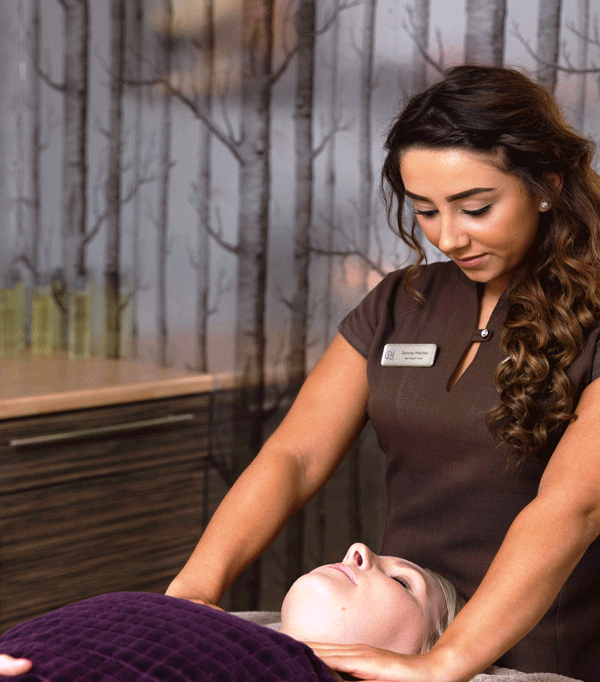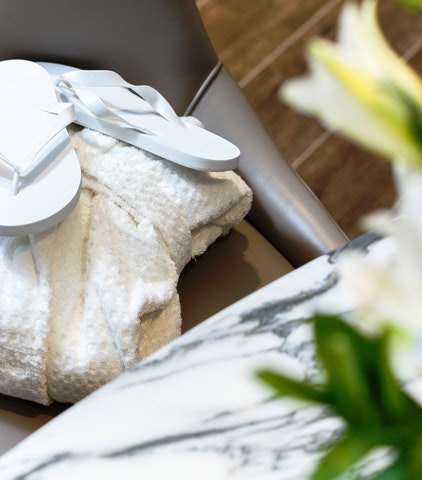
Retreat Spa Visits For Those Living With Cancer
Dealing with cancer is a stressful time that derails normal life and fills you with uncertainty. While a few hours at a spa can provide a welcome respite, there are some things to bear in mind. In this guide, we address some common questions you may have about enjoying a spa experience during and after cancer treatment.
Can you enjoy a spa when undergoing cancer treatment?
Yes. In fact, spas can be a wonderful way to promote wellness and relaxation, both during treatment and during recovery. However, there is a range of issues to consider, including:
- Surgery: If you have recently had surgery (of any type), most spa facilities and treatments will be off-limits. Six months is often the minimum length of time you need to wait after surgery.
- Treatment: The type of cancer treatment you are undergoing can impact the spa treatments and facilities you can enjoy. Check with your doctor or cancer nurse, as everyone reacts differently to cancer treatment.
- General health: If you have any other health concerns or underlying conditions, consult with your doctor before visiting a spa.
You should be aware that some spas have restrictive policies when it comes to cancer, which means certain treatments and facilities may be limited or unavailable. A doctor’s note may even be required in some instances. Let us know at the time of booking or contact your chosen spa ahead of your visit to ensure you won’t be disappointed.
It is very important that you let the spa know about your cancer. The rules may seem a little unfair, but they are in place to ensure the health and safety of all guests. Not all spas are equipped to treat clients with cancer, so by being open about your condition you can ensure you’ll enjoy a safe, positive spa experience.
That being said, many spas embrace guests living with or in recovery from cancer, offering special treatments, packages and techniques that promote your overall wellbeing. We’ve listed a few of these at the end of the guide.
Cancer and spa treatments
People understandably have questions when it comes to what treatments guests with cancer (or in recovery) can enjoy. While the following does not replace expert medical advice, we have provided answers to a few general concerns:
Can you have a massage if you have cancer?
Related to this is whether you can have a massage during chemotherapy. The answer is generally, yes. However, firmer pressure massages (such as deep tissue massage) should be avoided. It is also advisable to avoid essential oils.
The therapist should take extra care around any particularly sensitive areas of the body, avoiding those which are being treated with radiotherapy. If you have lymphoedema, the massage should avoid the affected arm and shoulder.
Some people are concerned that a massage can somehow encourage the spread of cancer around the body. However, the Breast Cancer Now website confirms “there is no evidence that massage can encourage breast cancer cells to spread around the body”. The charity adds: “it’s safe to have a massage even if you’re currently having treatment such as chemotherapy.”
You can find more information on cancer and massage from Macmillan Cancer Support.
Advantages of massage for cancer patients
Gentle massage is often used as a complementary cancer treatment, alongside conventional treatment options. Among the benefits of massage for cancer patients are:
- General relaxation
- Combatting fatigue
- Boosting overall wellbeing
- Improving muscle stiffness
Massages you might like
A good option for cancer patients can be a light-touch back, neck and shoulders massage. Alternatively, you might consider a head massage, which focuses on the scalp and upper neck area. In some cases, a specialist lymphatic drainage massage may be appropriate. We would always recommend consulting with your doctor before booking a spa massage treatment.
Can cancer patients use hot tubs, saunas and steam rooms?
In general, extreme heat facilities, including saunas and steam rooms, should be avoided to protect sensitive skin. Increased body temperature can also be a risk factor in developing lymphoedema. So, the best advice is to check with your doctor. Ultimately, the choice is yours, but many people prefer to err on the safe side.
Is anything else off-limits?
There are a few other things you may wish to avoid or limit during your cancer treatment:
- Chemicals (including nail polish and the chlorine in swimming pools)
- Oestrogenic substances
- Certain essential oils
(The last two have the potential to interfere with treatments.)
These are just general guidelines – it’s important to check with your own medical team about what is best during your particular treatment regime.
What are the best spa treatments to enjoy during/after cancer?
There are some great complementary treatments that can help you get through your treatment and aid you in your recovery. These include:
- Acupuncture: can help to ease fatigue and certain other side-effects associated with cancer treatments (such as nausea)
- Reflexology and acupressure: can aid relaxation and improve wellbeing (it is important the therapist is trained in treating patients with cancer)
- Hand and foot massage: this can be a good alternative to a manicure or pedicure if you want to avoid nail polishes (or don’t want a therapist to touch your body more extensively)
- Facials: can soothe dry or flaky skin (the therapist should ideally use gentle, natural and organic products)
The overall point is that you need to find the right path for you – for example, some might enjoy the light touch of a massage therapist, while others would prefer not to have their bodies touched at all. Likewise, self-consciousness or low self-esteem relating to the effects of treatment may be helped or hindered by a session at the spa.
It’s all about understanding your body and doing everything you can to promote your own wellbeing, physical and mental.
What the experts say…
Lifehouse Spa & Hotel in Essex offers recovery breaks for people undergoing treatment for cancer. The therapists were trained by experts at the Christie NHS Foundation Trust in how to massage and physically handle patients who might be suffering from the effects of chemotherapy or other treatments.
The spa’s director of health & wellness and resident naturopath, Sue Davis, says:
“Some therapists can find it hard to give a treatment to someone suffering from cancer. They don’t want to hurt them, so aren’t sure how to touch them, and some even thought that by massaging them too hard they might ‘spread’ the cancer. Working with the Christie Trust really helped to dispel a lot of myths and we’re now pleased to be able to offer nurturing and wellbeing breaks for people who really need it.”
More spas that cater to people living with or after cancer
The following spas are among those that offer a range of treatments and techniques suitable for clients with special wellness requirements:
- Rudding Park in Yorkshire
- Hoar Cross Hall in Staffordshire
- Macdonald Bath Spa Hotel in Somerset
If you’d like to find out more or are ready to book your next spa experience contact the SpaSeekers’ team today.





